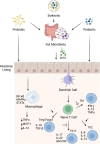Dietary Component-Induced Inflammation and Its Amelioration by Prebiotics, Probiotics, and Synbiotics
- PMID: 35938108
- PMCID: PMC9354043
- DOI: 10.3389/fnut.2022.931458
Dietary Component-Induced Inflammation and Its Amelioration by Prebiotics, Probiotics, and Synbiotics
Abstract
A balanced diet with many dietary components maintains immune homeostasis directly by interacting with innate and adaptive immune components or indirectly through gut microbiota and their metabolites. Dietary components may inhibit pro-inflammatory mediators and promote anti-inflammatory functions or vice versa. Western diets with imbalanced dietary components skew the immune balance toward pro-inflammation and induce intestinal inflammation, consequently leading to many intestinal and systemic inflammatory diseases like ulcerative colitis, Crohn's disease, irritable bowel syndrome, cardiovascular problems, obesity, and diabetes. The dietary component-induced inflammation is usually chronic in nature and frequently caused or accompanied by alterations in gut microbiota. Therefore, microbiome-targeted therapies such as probiotics, prebiotics and synbiotics hold great potentials to amend immune dysregulation and gut dysbiosis, preventing and treating intestinal and systemic inflammatory diseases. Probiotics, prebiotics and synbioitcs are progressively being added to foods and beverages, with claims of health benefits. However, the underlining mechanisms of these interventions for preventing and treating dietary component-induced inflammation are still not very clear. In addition, possibly ineffective or negative consequences of some probiotics, prebiotics and synbiotics call for stringent testing and regulation. Here, we will first briefly review inflammation, in terms of its types and the relationship between different dietary components and immune responses. Then, we focus on current knowledge about the direct and indirect effects of probiotics, prebiotics and synbiotics on intestinal and systemic inflammation. Understanding how probiotics, prebiotics and synbiotics modulate the immune system and gut microbiota will improve our strategies for preventing and treating dietary component-induced intestinal inflammation and inflammatory diseases.
Keywords: dysbiosis; inflammation; microbiota; prebiotics; probiotics; synbiotics; undernutrition; western diet.
Copyright © 2022 Bilal, Ashraf and Zhao.
Conflict of interest statement
The authors declare that the research was conducted in the absence of any commercial or financial relationships that could be construed as a potential conflict of interest.
Figures




Similar articles
-
Role of prebiotics, probiotics, and synbiotics in management of inflammatory bowel disease: Current perspectives.World J Gastroenterol. 2023 Apr 14;29(14):2078-2100. doi: 10.3748/wjg.v29.i14.2078. World J Gastroenterol. 2023. PMID: 37122604 Free PMC article. Review.
-
Reviewing the potential of probiotics, prebiotics and synbiotics: advancements in treatment of ulcerative colitis.Front Cell Infect Microbiol. 2023 Dec 8;13:1268041. doi: 10.3389/fcimb.2023.1268041. eCollection 2023. Front Cell Infect Microbiol. 2023. PMID: 38145046 Free PMC article. Review.
-
Beneficial Effects of Probiotics, Prebiotics, Synbiotics, and Psychobiotics in Inflammatory Bowel Disease.Inflamm Bowel Dis. 2015 Jul;21(7):1674-82. doi: 10.1097/MIB.0000000000000364. Inflamm Bowel Dis. 2015. PMID: 25822014 Review.
-
New approaches for bacteriotherapy: prebiotics, new-generation probiotics, and synbiotics.Clin Infect Dis. 2015 May 15;60 Suppl 2(Suppl 2):S108-21. doi: 10.1093/cid/civ177. Clin Infect Dis. 2015. PMID: 25922396 Free PMC article. Review.
-
Probiotics, prebiotics, and synbiotics to prevent or combat air pollution consequences: The gut-lung axis.Environ Pollut. 2022 Jun 1;302:119066. doi: 10.1016/j.envpol.2022.119066. Epub 2022 Feb 28. Environ Pollut. 2022. PMID: 35240267 Review.
Cited by
-
Emerging issues in probiotic safety: 2023 perspectives.Gut Microbes. 2023 Jan-Dec;15(1):2185034. doi: 10.1080/19490976.2023.2185034. Gut Microbes. 2023. PMID: 36919522 Free PMC article.
-
A comprehensive review on the implications of Yogic/Sattvic diet in reducing inflammation in type 2 diabetes.Nutr Diabetes. 2025 Apr 11;15(1):14. doi: 10.1038/s41387-025-00371-0. Nutr Diabetes. 2025. PMID: 40216734 Free PMC article. Review.
-
Breaking the barriers: the role of gut homeostasis in Metabolic-Associated Steatotic Liver Disease (MASLD).Gut Microbes. 2024 Jan-Dec;16(1):2331460. doi: 10.1080/19490976.2024.2331460. Epub 2024 Mar 21. Gut Microbes. 2024. PMID: 38512763 Free PMC article. Review.
-
The Interplay between Structural Inequality, Allostatic Load, Inflammation, and Cancer in Black Americans: A Narrative Review.Cancers (Basel). 2024 Aug 30;16(17):3023. doi: 10.3390/cancers16173023. Cancers (Basel). 2024. PMID: 39272881 Free PMC article. Review.
-
Foundational Nutrition: Implications for Human Health.Nutrients. 2023 Jun 22;15(13):2837. doi: 10.3390/nu15132837. Nutrients. 2023. PMID: 37447166 Free PMC article. Review.
References
Publication types
LinkOut - more resources
Full Text Sources
Miscellaneous

